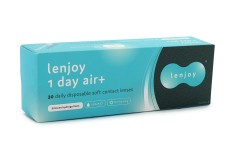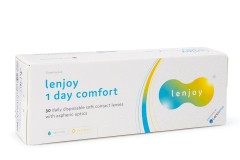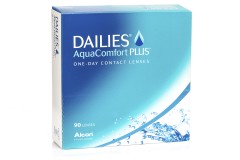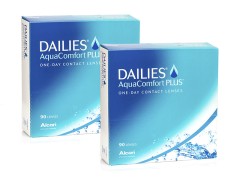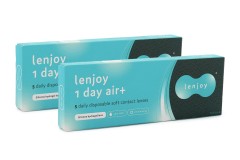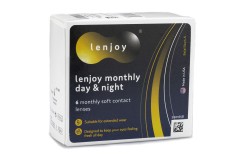The best contact lenses for dry eyes in 2025

Table of contents
From dry eye syndrome (DED) to contact lens induced dry eyes (CLIDE) and occasional episodes of ocular dryness due to environmental reasons, in this day and age, millions of contact wearers suffer from or have experienced dry eyes.
With the help of our opticians, in this article we will take a closer look at the topic. We will discuss the common symptoms of dry eyes, provide a selection of suitable contact lenses and some tips to alleviate this problem.
Can you wear contact lenses with dry eyes?
If you have dry eyes, you can still wear contact lenses. Soft contacts, in particular, are often suggested over hard contact lenses for those who have this issue. Optometrists of course advise against prolonged lens wear when the eye is in an acute dry phase, is irritated, itchy or red.
During these times, it is always recommended to rest and re-oxygenate the eyes. This can be achieved by alternating the use of glasses and lenses to prevent the typical discomfort of dry eye.
Tips for people with dry eyes who wear contact lenses
- Apply eye drops suitable for contact lenses
- Let your eyes rest by wearing glasses from time to time
- Take breaks while working, especially when working at the computer
- Switch to daily disposable lenses made of silicone hydrogel
- Drink more water during the day
- Choose foods rich in omega-3
How we chose the best contacts for dry eyes
We researched numerous scientific studies on the matter, consulted our expert optometrists, took into account the reviews and experiences of our loyal customers. In the selection you will find below, we will show you some contact lens models that may be suitable for dry eye sufferers.
What are the best contact lenses for dry eyes?
Highly breathable and well lubricated lenses are often the best choice for wearers who suffer from dry eye syndrome. This is why our optometrists at Lentiamo recommend silicone hydrogel lenses for dry eyes.
The best contacts for dry eyes according to our experts:
- Acuvue Oasys 1-Day with HydraLuxe
- Air Optix Plus Hydraglyde
- Bausch + Lomb ULTRA
- Bausch + Lomb ULTRA One Day
- Biofinity
- Biotrue ONEday
- DAILIES Total 1
- Precision 1
- TOTAL 30
- 1-DAY Acuvue Moist
Here is a more detailed breakdown of the different types of contact lenses suitable for dry eyes.
Best daily disposable contact lenses for dry eyes
Best monthly contact lenses for dry eyes
Best toric contact lenses for dry eyes
Best multifocal contact lenses for dry eyes
Which type of contact lenses is best for dry eyes?
Silicone hydrogel lenses are the most breathable amongst soft contact lenses and they are often prescribed tho wearers who suffer from dry eye syndrome. Good oxygen permeability is a crucial factor to promote healthy eyes and prevent dryness. Contacts, however thin and moisturised they may be, reduce the oxygen flow to the cornea and can cause dryness, therefore choosing lenses with high oxygen transmissibility can result in healthier and less dry eyes.
Lenses with the highest water content are not always the most suitable for dry eye sufferers. Throughout the day, highly hydrophilic lens materials with high water content will tend to absorb water directly from the eye, leading to an eventual state of dryness. Rehydrating the lenses, even while wearing them, is however possible with contact lens-specific eye drops.
Classic hydrogel lenses are generally richer in water, while more modern silicone hydrogel lenses have lower water percentages but allow more oxygen to pass through to the cornea. There are also contact lenses – made either of hydrogel or silicone hydrogel – that are enriched with hyaluronic acid and developed with dry eye syndrome sufferers in mind.
Our recommendation: To find out whether hydrogel or silicone hydrogel lenses are more suitable for you, consult an optometrist who can advise you and let you test different materials.
Are daily lenses better for dry eyes than monthly lenses?
According to many eye specialists, daily lenses can be a wiser choice for those who suffer from dry eyes. Unlike monthly lenses, daily disposable contacts are less prone to protein deposit build-ups and, in general, less prone to protein deposit build-ups because they are disposed of each night. Moreover, dailies don't feel as heavy on the eyes as they are meant for a single use. They don't need to be quite as durable as monthly lenses.
Discarding your lenses after each use also means a lower risk of contamination and maintenance-related mistakes. Furthermore, they are an excellent choice for intermittent wear. Ophthalmologists, in fact, often recommend that their dry-eyed patients avoid wearing contact lenses on a daily basis.
Symptoms of dry eyes
The most common symptoms of dry eyes are:
- A stinging, burning or scratchy sensation in your eyes
- Stringy mucus in or around your eyes
- Sensitivity to light
- Eye redness
- A sensation of having something in your eyes
- Difficulty wearing contact lenses
- Difficulty with nighttime driving
- Watery eyes, which is the body's response to the irritation of dry eyes
- Blurred vision or eye fatigue
What causes dry eyes?
Dry eyes can be caused by several factors. Sometimes there is one main cause, sometimes it’s a combination of many. Generally, the underlying causes can be identified by the eye care professional through an eye exam and an analysis of the tear film.
Diagnosis and appropriate management of symptoms will help decrease discomfort and improve quality of vision, quality of life.
 Some of the most common causes of dry eyes include:
Some of the most common causes of dry eyes include:
- Frequenting dry and dusty environments
- Exposure to wind and UV rays
- Unhealthy habits (such as smoking, poor diet, dehydration, etc.)
- Allergens or pollution in the air
- Ageing
- Wearing the wrong prescription
- Tear duct-related issues
- Incorrect or prolonged use of contact lenses
- Diseases (such as hormonal related conditions, diabetes, blepharitis and more)
- Adverse postoperative outcome after laser refractive surgery
- Prolonged use of certain medications
Do contact lenses cause dry eyes?
Incorrect contact lens wear — be it due to wrong prescription, improper cleaning and care, or use beyond the replacement time — can cause dry eyes. In some cases, changing the type of contact lenses or starting to wear them more consciously may be enough to prevent dry eyes. In other cases, contact lenses may not be the only trigger. Environmental factors, lifestyle or medical issues can also be related to dry eyes.
To find out more, book a visit to your ophthalmologist.
How are dry eyes treated?
Ophthalmic gels and eye drops with lubricating or moisturising properties can help relieve dry eyes. Sometimes to get rid of dry eyes, it is necessary to change our lifestyle, follow specific instructions or take prescriptions from a specialist. Chamomile compresses, applied to the eyelids for a few minutes, can also help in mild cases as they have a calming effect and promote tear production.
In cases of dry eyes caused by chronic illness, for example, it's not always possible to cure them in a definitive way, but it is still possible to ease the symptoms.
Moisturising eye drops, also known as 'artificial tears', are available with specific formulations for contact lens wearers. There are many types of artificial tears on the market – some with lipid components that can help to patients who have problems with evaporative dry eyes (e.g., insufficient function of Meibomian gland). This kind can't be used while wearing contact lenses.
To choose the right type of artificial tears, it is necessary to visit your eye care specialist for a detailed screening.
Read more
The best multifocal contact lenses
The best toric lenses for astigmatism














